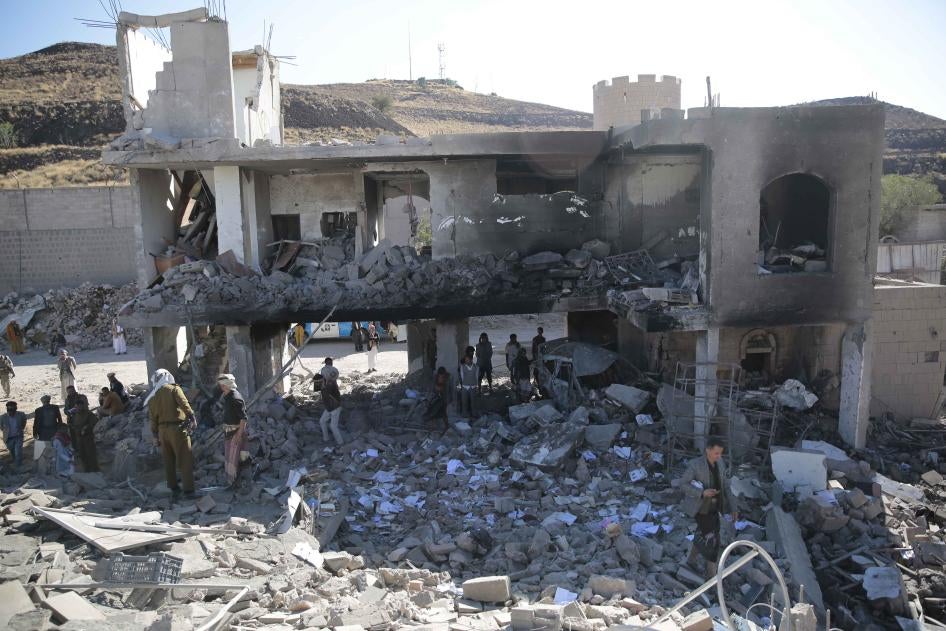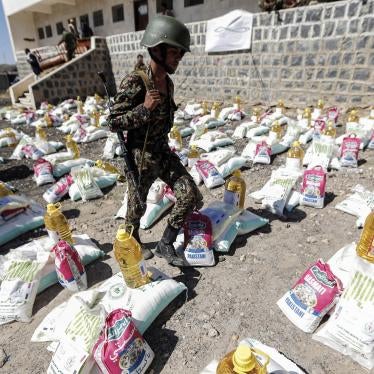(Beirut,) – The United Kingdom’s High Court of Justice is scheduled to hear a challenge to the UK government’s renewed arms sales to Saudi Arabia this afternoon, Human Rights Watch said today. The UK government should immediately stop granting licenses for the export of arms to countries like Saudi Arabia that have a record of serious violations of international humanitarian law.
On July 7, 2020, the UK government announced that it would resume arms sales to Saudi Arabia after determining that any Saudi violations of international law during conflict in Yemen were simply “isolated incidents.” In 2019, the UK Court of Appeal had ordered the government to stop issuing new licenses for arms sales to Saudi Arabia after finding that it had made no attempt to assess whether the Saudi-led coalition had committed violations of international humanitarian law during the Yemeni conflict when deciding whether there was a clear risk of future violations.
“The ample evidence of laws of war violations by the Saudi-led coalition in Yemen throughout the war make clear that these violations are not simply ‘isolated incidents’ as claimed by the UK government,” said Niku Jafarnia, Yemen and Bahrain researcher at Human Rights Watch. “UK weapons have been used in some of these violations with total impunity.”
The conflict in Yemen began in 2014, and Saudi Arabia, leading a coalition of nine countries, became a party to the conflict on March 26, 2015, at the request of the Yemeni government. Since 2015, Yemen Data Project has recorded at least 25,054 airstrikes. The airstrikes are only attributable to the coalition, as the Houthi armed group, the government’s main opponent in the conflict, does not have an air force.
The war has led to a humanitarian catastrophe in the country. Of a population of 30 million, 17 million people are food insecure, an estimated 4.5 million people are currently displaced, and 76 percent of the population is in need of humanitarian aid.
The current case comes after several years of litigation, which began in 2016 when the Campaign Against Arms Trade (CAAT), a UK-based organization campaigning against the arms trade, first filed an application for Judicial Review into the legality of the UK government’s sales of arms to Saudi Arabia. On June 20, 2019, the UK Court of Appeal ruled in favor of CAAT, finding that the UK government’s licensing grants for the export of arms sales to Saudi Arabia was “irrational and therefore unlawful” without a proper assessment of the possible risks that these arms would be used in continuing violations of international humanitarian law in light of past violations.
Several organizations, including Human Rights Watch; Mwatana for Human Rights, an independent Yemeni human rights group; Amnesty International, and Oxfam intervened in the case, providing copious evidence of Saudi-led coalition attacks on civilians and civilian infrastructure, as well as the use of UK weapons in many of these attacks. According to Mwatana, these incidents included attacks on a community college in Sana’a on January 8 and 10, 2016, a warehouse in Hudaydah on January 6, 2016, and a factory making water pumps on September 12, 2016.
The UK announced it would resume arms sales to Saudi Arabia in July 2020, despite continued Saudi airstrikes in Yemen that have caused hundreds of civilian casualties. In 2022, despite a UN-brokered six-month truce, Mwatana for Human Rights documented 28 airstrikes, which killed at least 110 civilians, including 14 children and 3 women. In January 2022 alone, Mwatana and Human Rights Watch documented three separate Saudi-led coalition airstrikes that apparently killed at least 80 civilians and wounded 156.
The UK has supplied Saudi Arabia with an estimated $23 billion in weapons since the start of the war, which has caused at least 19,226 civilian casualties, according to Yemen Data Project. These UK-supplied weapons include Paveway guided bombs, Typhoon and Tornado aircraft, and Brimstone and Storm Shadow missiles – all of which the UK government has admitted have been deployed in the conflict in Yemen.
Based on the data Yemen Data Project has collected, the airstrikes have killed at least 8,983 civilians and injured 10,243. Beyond the direct civilian casualties, the coalition has also attacked significant civilian infrastructure across the country, including hospitals, schools, bridges, dams, farms, irrigation works, and more – all of which are violations of the laws of war.
There has been almost no accountability for the civilian harm caused by the conflict. Yemeni civil society, nongovernmental organizations, the United Nations, and many governments have been calling for an independent investigative mechanism for several years. But in 2021, under pressure from Saudi Arabia, 21 member countries of the United Nations Human Rights Council rejected the renewal of the Group of Eminent Experts, which was the only existing international, independent, and impartial mechanism monitoring human rights violations in the conflict. According to data from the Civilian Impact Monitoring Project, civilian casualties nearly doubled in the four months after the renewal was rejected.
“The evidence is clear that Yemeni civilians have died and continue to die as a result of weapons sales licensed by the United Kingdom Government,” Jafarnia said. “At a time when the UK is promoting a rules-based international order, and rightly calling out Russia for serious violations of international law, it needs to apply those same rules to itself and end the sale of weapons to Saudi Arabia.”









